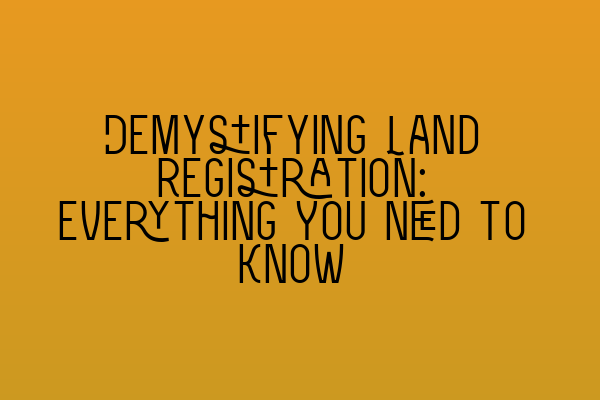Demystifying Land Registration: Everything You Need to Know
As a property law solicitor, I often come across clients who are baffled by the intricacies of land registration. With complex terminology and convoluted processes, it’s no wonder this area of law can be daunting. However, understanding land registration is essential for any property owner or buyer. In this blog post, I will demystify land registration and provide you with everything you need to know.
What is Land Registration?
Land registration is the process of creating an official record of who owns and has rights over a piece of land or property. It provides certainty and protection for both buyers and sellers, as well as enabling the smooth transfer of ownership. In England and Wales, land registration is governed by the Land Registration Act 2002.
Before land registration became compulsory in 1925, ownership of land was established through a system of deeds and paperwork. However, this system was often complex and prone to inaccuracies. Land registration introduced a more efficient and reliable method of establishing and proving ownership.
Key Principles of Land Registration
1. Indemnity: Land registration provides an indemnity scheme, which means that if you suffer a loss due to a mistake or error in the register, you may be entitled to compensation.
2. Priority: The principle of priority ensures that the first person to register their interest in land takes priority over subsequent registrations. This prevents multiple claims and disputes over ownership.
3. Notice: The register acts as notice to the world of your ownership or interest in the land. It protects your rights and prevents others from claiming ignorance of your ownership.
The Land Registration Process
The land registration process involves several key steps:
- Application: To register land for the first time, you must submit an application to the Land Registry. This includes completing the necessary forms and providing supporting documentation.
- Examination: The Land Registry will examine your application, checking for any errors or omissions. They may request additional information or documents.
- Official searches: The Land Registry will conduct official searches to verify the details provided in the application and identify any restrictions or interests affecting the land.
- Notice and objections: The Land Registry will notify anyone with registered interests in the land about the application and give them an opportunity to raise objections or disputes.
- Completion: Once all queries and objections are resolved, the Land Registry will complete the registration, updating the register to reflect the new ownership or interests.
This process can take several weeks or months, depending on the complexity of the application and any objections raised. It is recommended to seek the assistance of a qualified solicitor to navigate the land registration process smoothly.
Benefits of Land Registration
The benefits of land registration include:
- Certainty of ownership: Land registration provides a clear and official record of ownership, reducing the risk of ownership disputes or confusion.
- Protection against fraud: Land registration helps protect against fraudulent transactions by verifying the identity of the parties involved and ensuring the authenticity of documents.
- Easy transfer of ownership: Registered land can be easily transferred through a simple process, saving time and hassle for both buyers and sellers.
- Access to information: The land register is a public document, allowing anyone to access information about the ownership and any restrictions or interests affecting the land.
Conclusion
Land registration may seem complex on the surface, but understanding its principles and processes is crucial for anyone involved in property ownership or transactions. By familiarizing yourself with land registration, you can confidently navigate the system and protect your interests.
If you have any further questions or require assistance with land registration, our expert team at SQE Property Law & Land Law is here to help. Contact us today for professional guidance and support.
Related Articles:
